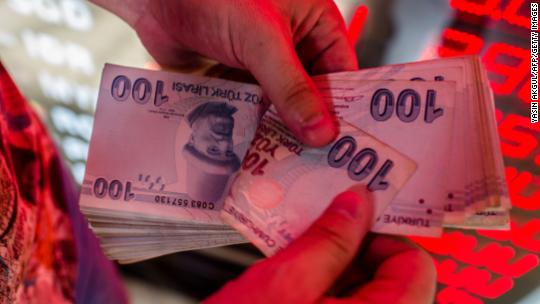ANKARA/ISTANBUL (Reuters) – Turkey took more unorthodox steps on Friday to protect its beleaguered lira, including scrapping a recently-hatched plan to tap the central bank’s legal reserves to boost its budget and urging banks to encourage clients to convert foreign holdings.
The message to banks was delivered by Mehmet Akben, chairman of the country’s BDDK banking watchdog, who said the currency was under attack from “speculators.”
The Turkish lira has come under renewed pressure in recent months as investors fretted about the threat of U.S. sanctions, uncertainty over local election results, declining central bank reserves and a trend of Turks ramping up foreign holdings.
The currency is down 12.5% this year after having shed 30% last year, when a currency crisis tipped its economy into recession.
The lira slid again on Monday after Reuters reported that Ankara was crafting legislation to transfer some 40 billion lira ($6.6 billion) from the central bank’s legal reserves to the Treasury to shore up a larger than expected budget deficit.
But on Friday, two sources told Reuters that plan was now abandoned. “It has been canceled for now,” said one of the sources, both of whom requested anonymity.
Economists were concerned over the prospect of weakening the central bank’s ability to respond to another crisis. They also worried that the plan would provide a one-time fiscal boost before the re-run of Istanbul elections on June 23, after which the economy could experience a tightening.
Piotr Matys, emerging markets forex strategist at Rabobank, said that even considering tapping into the central bank’s reserves stoked such concerns, adding its damage on the lira had been done.
“Investors would be wondering what other tools the administration may use to stimulate lending (and) growth at a time when they don’t have much room to maneuver,” he said.
Ankara doesn’t have much room to boost spending ahead of elections given that budget revenues are low, Matys added.
The central bank by law sets aside “legal reserves” from its profits to be used in extraordinary circumstances, and they are separate from its forex reserves which have dwindled in recent months. At the end of 2018, the legal reserves stood at 27.6 billion lira, according to the bank’s balance sheet data.
In January, the bank transferred some 37 billion lira in profits to the Treasury three months earlier than scheduled.
Despite that January boost, Turkey’s budget recorded a 54.5 billon lira deficit in the first four months of this year, Treasury and Finance Ministry data showed. The government’s forecast for 2019 year-end deficit is 80.6 billion lira.
A broader erosion of confidence in the lira has led to an increase in locals’ forex holdings, which surged in the six months leading up to April.
Akben, head of the banking watchdog, called on lenders on Friday to make an effort to turn deposits in foreign currencies into lira. Asked how banks can do this, he said each bank may have a different method.
“For example, (banks’) branches being given premiums for holding lira deposits can be an option. Branches can be assigned targets,” Akben said.



